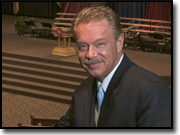Visitor Follow-up by Joe Cala
Visitor Follow-up
Joe Cala
 Joe Cala is the author of, “Living Your Life Today—The Fool Proof Way!” and “The Proven Formula of Success!” traveling minister, seminar leader, creator of “The Next Step Visitor Follow-Up System”, contributor of Personal Excellence Magazine and the founder of ChurchSync and Joe Cala Ministries. Visit www.churchsync.com or contact Joe at 848-248-0730 or by email at [email protected] to set up a time for a FREE Strategy Session or to schedule on site training, leadership training and guest services training.
Joe Cala is the author of, “Living Your Life Today—The Fool Proof Way!” and “The Proven Formula of Success!” traveling minister, seminar leader, creator of “The Next Step Visitor Follow-Up System”, contributor of Personal Excellence Magazine and the founder of ChurchSync and Joe Cala Ministries. Visit www.churchsync.com or contact Joe at 848-248-0730 or by email at [email protected] to set up a time for a FREE Strategy Session or to schedule on site training, leadership training and guest services training.

 How Many More People Do I Want to Be Attending My Church By the End of This Year?
How Many More People Do I Want to Be Attending My Church By the End of This Year?
So many Pastors live week-to-week, month to month and year to year just waiting to see where they’ll be in regards to church growth. In talking to many Pastor’s they truly have a desire to see numerical growth in their churches but just sit back and see how it all turns out without putting together a plan. How many would you like to increase by? 50 people, 60 people, 100 people, etc…? 10%, 20%, 50%, etc…? Whatever the number or percentage is, by the end of this article you will have a solid plan to reach it.
It’s time to start being proactive and not just reactive in regards to visitor follow up. Faith without works is dead. If we never put an action plan together to help us move towards what we believe, then how do we expect to see the provision we are looking to achieve. Here are some strategies to help you get started.
1. Take Inventory
In other words; see where you are right now. Find out how many people on average attend your church on a weekly basis. If you don’t do this already, then start taking attendance each week. How many are really coming. In most cases, Pastors “evangelastically” increase their numbers when someone asks them how many are attending their church. If 100 people were there, about 150 or so attended according to them. Be truthful to yourself and find out where you are so you can begin to put together your plan for increase and growth.
2. How Many Visitors Came to Your Church
Find out how many visitors attended your services this year. Then find out how many stayed. This is vital. These numbers prove to you that God has been trying to grow your church. We don’t believe that people show up to our services by coincidence, right? No, we believe that they were someway or somehow led to our services by God. It is a Divine appointment. He is the best recruiter for our churches. He is constantly drawing people in. So how many people visited last year? Count all the visitor cards. If you don’t have them then here’s how you can find out how many visited and stayed.
For example: If you have 150 people currently attending on average, about 100 people visited last year and 10 stayed and became consistent attendees, then you originally had 140 people attending starting at the beginning of the year and increased your growth by 10% of the people who visited and 7% of the people who were consistently attending.
It’s so important to measure and track your data and records. This will help you see your results, strengths, weaknesses and opportunities in visitor and member retention.
3. Utilize “How Did You Here About Us?” on Your Visitor Cards
Why is this so important? Because this will help you see where your most effective avenue of influence is in bringing in new guests. This will also help you see where your not so effective areas are as well.
For example: If you are spending $500.00 a month on the Yellow Pages and most of the guests are marking that they heard about you through a web search and no one has marked yellow pages in 6 months then start redirecting those funds over to digital marketing to expand your presence on the web to be more effective in driving people through your doors.
Here are some, “How Did You Hear About Us?” lines to put on your Guest Cards. You can choose a few or use them all, it’s your call.
If you are marketing on radio:
If you are marketing on Radio _____ What Station? ______________________
If you are marketing on TV: TV ______
What Channel? _________________________
Driving By _______________________________
Friend or Relative _________
Name of Friend or Relative ________________________
Internet ___________
Which Search Engine or Site?
Google__ AOL __ Yahoo __ Bing __ YouTube __ MSN __ Facebook __ Twitter __
If you are marketing with Billboards: Billboard ____ Location ____
Other ____
Please tell us what other source you heard about us from: _________
4. Project How Many People You Want to Be Attending By The End of Next Year!
This is beginning with the end in mind. This is how faith works. Faith begins with the end in mind. It starts off seeing the provision and creates a plan to help allow the provision the easiest access to manifest into our lives.
For example: Your goal is that you want to grow by 50 people by the end of this year. That is the end result you want to reach.
So if you had 100 visitors this past year and want to grow from 150 to 200 attendees then based off of how you increased last year, (10%), you will either need 500 visitors to come in so you can retain 50 of them to grow to 200 from 150, or you will need to come up with an aggressive strategy to help retain visitors at a higher percentage. To break it down in months you then divide the number you want to grow to, (50) more, by 12 months and you come up with (4). This is the number of people you aim to grow the church by each month. If you break it down even further you are aiming to grow your church by 1 person every week to reach 50+ by the end of this year. This is not impossible. As a matter of fact it is very realistic, especially when you have a process in place to make it come to pass.
How many Pastors are really doing this? If you have your faith hooks sunk into a solid number to believe you will increase to then God has something to put substance to. Let’s start believing for specific increase not just increase with no number on it.
5. Start Putting Together Strategies & Outreaches to Attract Visitors to Your Services
Now that you know what you are aiming at and what you are believing for, then start having staff, board and creative meetings to come up with ways to attract guests. Here is a list of ideas you can visit and use. http://www.churchsync.com/how-to-get-visitors-to-attend.html
6. Follow Up & Follow Through
Have your Guest Services team develop a strong follow up process in order to retain those guests. Put together a detailed map of follow up from the same day they first visited till 40 days after they visited to keep your services, functions, encouragement and ministries in front of them.
7. Go After the One Which is Lost Until He Finds it!
Luke 15:4 (New King James Version) 4 “What man of you, having a hundred sheep, if he loses one of them, does not leave the ninety-nine in the wilderness, and go after the one which is lost until he finds it?
Notice it says, “What man of you, having a hundred sheep, if he loses one of them…”
This tells us that the sheep was in our flock first before it was lost. In other words, the sheep, the visitor, came into our church. When they leave and never come back, it’s not their fault. This verse doesn’t blame them for getting lost. It doesn’t say, “What man of you, having a hundred sheep, if one of the sheep gets lost, does not leave the ninety-nine in the wilderness, and go after the one which is lost until he finds it?”
No it says, “if he loses one of them…” Who’s “HE”? The Shepherd of the sheep. If the visitor doesn’t come back the blame doesn’t fall on them, it falls on us. We lost them. This is why it is so important to do the rest of this verse. “Go after the one which is lost until he finds it!” This is why it’s so important to come up with a short and long term follow up system that can continue to guide the visitor back through our doors and into the fold.
As you apply these strategies you will see growth in your church by the end of this year!
- Take Inventory
- How Many Visitors Came to Your Church
- Utilize “How Did You Here About Us?” on Your Visitor Cards
- Project How Many People You Want to Be Attending By The End of Next Year
- Start Putting Together Strategies & Outreaches to Attract Visitors to Your Services
- Follow Up & Follow Through
- Go After the One Which is Lost Until He Finds it!
To discuss these strategies in further detail feel free to contact me today. Working together to make your church better.

 Pastor Mark Cowart has been in full-time ministry for over 26 years. His call to serve the body of Christ results in his total commitment to prayer, the Word of God, the local church, and reaching the nations.
Pastor Mark Cowart has been in full-time ministry for over 26 years. His call to serve the body of Christ results in his total commitment to prayer, the Word of God, the local church, and reaching the nations. 
 Several years ago I taught a series to our church entitled “The Power of Vision.” I went into great detail about the importance of having a clear and concise vision for every aspect of life and committing it to writing. I explained that after your vision has been written, there would be times that you would need to do a vision revision. This is simply a time for reviewing what you have written and a time for taking a fresh look at where you are in relation to your vision, so that necessary adjustments can be made.
Several years ago I taught a series to our church entitled “The Power of Vision.” I went into great detail about the importance of having a clear and concise vision for every aspect of life and committing it to writing. I explained that after your vision has been written, there would be times that you would need to do a vision revision. This is simply a time for reviewing what you have written and a time for taking a fresh look at where you are in relation to your vision, so that necessary adjustments can be made. A common question our firm regularly receives from pastors and church business administrators regarding their organizations is “______ a valid expenses that can be paid for directly out of our ministry?” We always appreciate it when we are asked this question in advance because we know that we are talking with an individual who is trying to do the right thing. Unfortunately, in our audit practice and especially in our preparation of IRS Form 990’s, we regularly see expenses and transactions that appear to have questionable ministry purpose. Several factors are at work in determining if an expense is valid for a non-profit organization.
A common question our firm regularly receives from pastors and church business administrators regarding their organizations is “______ a valid expenses that can be paid for directly out of our ministry?” We always appreciate it when we are asked this question in advance because we know that we are talking with an individual who is trying to do the right thing. Unfortunately, in our audit practice and especially in our preparation of IRS Form 990’s, we regularly see expenses and transactions that appear to have questionable ministry purpose. Several factors are at work in determining if an expense is valid for a non-profit organization. Mark Garver currently pastors Cornerstone Word of Life Church (
Mark Garver currently pastors Cornerstone Word of Life Church ( “What is the role of a pastor?” If you asked that question in a poll, you would undoubtedly get many varied and differing opinions depending upon who you asked. If you asked church members, you would get many different opinions. If you asked other Pastors, you would get varying opinions, but I think the best place to look is in the Word. Of course you can expand and elaborate on what I am about to share, but if this is not our basic foundation for pastoring, I am concerned that we will not be what the Lord desires us to be as Pastors and ministers of the Gospel.
“What is the role of a pastor?” If you asked that question in a poll, you would undoubtedly get many varied and differing opinions depending upon who you asked. If you asked church members, you would get many different opinions. If you asked other Pastors, you would get varying opinions, but I think the best place to look is in the Word. Of course you can expand and elaborate on what I am about to share, but if this is not our basic foundation for pastoring, I am concerned that we will not be what the Lord desires us to be as Pastors and ministers of the Gospel. Every pastor has received at least one.
Every pastor has received at least one. God’s cry for the nations resounds in the hearts of Rodney and Nita Lloyd. They have been in ministry together since 1974. They have planted and overseen churches in the United States and ministered to churches and Bible Schools in the USA as well as in African, European, and Asian nations and in Australia. Their Kingdom message stirs hearts to faith and obedience.
God’s cry for the nations resounds in the hearts of Rodney and Nita Lloyd. They have been in ministry together since 1974. They have planted and overseen churches in the United States and ministered to churches and Bible Schools in the USA as well as in African, European, and Asian nations and in Australia. Their Kingdom message stirs hearts to faith and obedience. Two years ago we met Alfie Fabe of Mitchells Plain. He is an apostolic father to many in several nations. In the twenty minutes of our first meeting, one thing he said that struck a cord in my heart was, “There are two kinds of ministry: professional and relational.” Since then, I have contemplated this much and discussed it with Alfie and others. I have had a passion to be the latter, having been the former for many years.
Two years ago we met Alfie Fabe of Mitchells Plain. He is an apostolic father to many in several nations. In the twenty minutes of our first meeting, one thing he said that struck a cord in my heart was, “There are two kinds of ministry: professional and relational.” Since then, I have contemplated this much and discussed it with Alfie and others. I have had a passion to be the latter, having been the former for many years.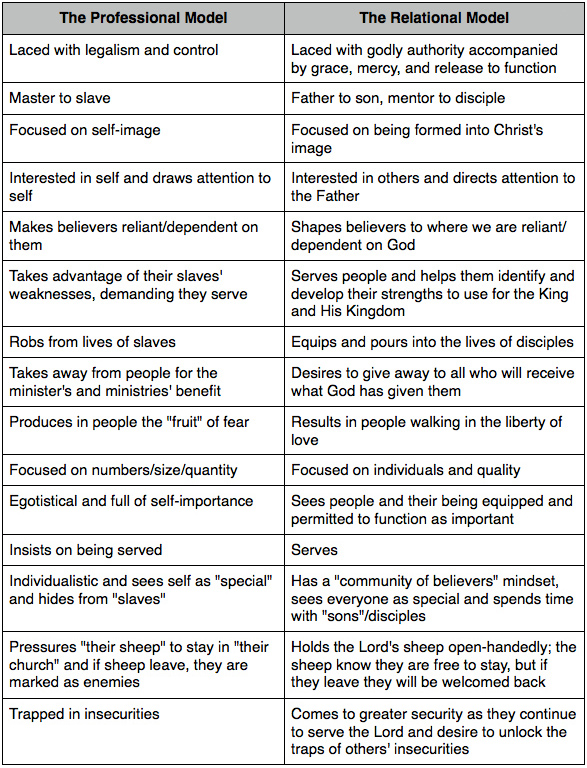

 In 1983, I graduated from Rhema Bible Training Center and began pastoring in a church in my home town. I served there for approximately twenty years. In a town of 400 people, we had many challenges but saw incredible growth and had a wonderful time.
In 1983, I graduated from Rhema Bible Training Center and began pastoring in a church in my home town. I served there for approximately twenty years. In a town of 400 people, we had many challenges but saw incredible growth and had a wonderful time. The more we understand what sin is all about and how it works, the better equipped we are to break free from its control. Actually, people usually don’t like to talk about sin, and yet, understanding how it works gives us the advantage and the power to get free from it. Turning on the lights always chases away the darkness.
The more we understand what sin is all about and how it works, the better equipped we are to break free from its control. Actually, people usually don’t like to talk about sin, and yet, understanding how it works gives us the advantage and the power to get free from it. Turning on the lights always chases away the darkness. Over the course of my career in working directly with pastors on their tax and personal finances I have seen a few “myths” that repeatedly come up in conversation and in practice. While I have seen other myths/misunderstandings of U.S. tax law in practice, the frequency of encountering the five “myths” listed below has led me proclaim these to be my personal “top five”. I am not sure how some of these get started, but once they do get started they tend to spread like wildfire. In no particular order, here is my list of top five tax and personal finance myths for pastors:
Over the course of my career in working directly with pastors on their tax and personal finances I have seen a few “myths” that repeatedly come up in conversation and in practice. While I have seen other myths/misunderstandings of U.S. tax law in practice, the frequency of encountering the five “myths” listed below has led me proclaim these to be my personal “top five”. I am not sure how some of these get started, but once they do get started they tend to spread like wildfire. In no particular order, here is my list of top five tax and personal finance myths for pastors:
 Sometimes we find ourselves in tough times that are of our own making,where the situation is one that we’ve created — whether intentionally or by accident. In other instances, tough times are individual situations that we didn’t create or put in motion. Like it or not, the reality is that some things come into our lives that are not our fault. They happen simply because we live in a fallen, broken world. We have to deal with those times even though we didn’t cause them and don’t deserve them.
Sometimes we find ourselves in tough times that are of our own making,where the situation is one that we’ve created — whether intentionally or by accident. In other instances, tough times are individual situations that we didn’t create or put in motion. Like it or not, the reality is that some things come into our lives that are not our fault. They happen simply because we live in a fallen, broken world. We have to deal with those times even though we didn’t cause them and don’t deserve them. Joel Sims has been the senior Pastor of Word of Life Church (Flowood, MS) for the past ten years. Word of Life is a church where people gather together to hear life, share life, and give life as they worship the Lord. Word of Life is thriving ministry that reaches 2,500 people every week for the Kingdom of God. Joel has been married to his beautiful wife, Peppi, for 8 years and are the parents of three children.
Joel Sims has been the senior Pastor of Word of Life Church (Flowood, MS) for the past ten years. Word of Life is a church where people gather together to hear life, share life, and give life as they worship the Lord. Word of Life is thriving ministry that reaches 2,500 people every week for the Kingdom of God. Joel has been married to his beautiful wife, Peppi, for 8 years and are the parents of three children.  It is an honor to be talking to you. I have gleaned much from Rev. Tony Cooke and the resources on this site. So it is a pleasure to help be a supply any way we can be. I suppose anyone in ministry could take something away from this article, but it is particularly designed for pastors taking over existing works. My name is Joel Sims and I took over the church I grew up in. In the early 1980’s, my father graduated from Rhema Bible Training center and came back to his home town of Jackson, MS where he started Word of Life Christian Fellowship.
It is an honor to be talking to you. I have gleaned much from Rev. Tony Cooke and the resources on this site. So it is a pleasure to help be a supply any way we can be. I suppose anyone in ministry could take something away from this article, but it is particularly designed for pastors taking over existing works. My name is Joel Sims and I took over the church I grew up in. In the early 1980’s, my father graduated from Rhema Bible Training center and came back to his home town of Jackson, MS where he started Word of Life Christian Fellowship.
 CPAs work with the tax code day in and day out and see a lot of items that provide the opportunity to save tax. Many of these items are used by CPAs to prepare their own returns and if you have ever wanted to take a peek under the hood of your CPA’s tax return, here is your chance. Reducing your tax liability requires a year round effort to plan and keep good records. Following are a few of the top tax saving strategies used by CPA’s:
CPAs work with the tax code day in and day out and see a lot of items that provide the opportunity to save tax. Many of these items are used by CPAs to prepare their own returns and if you have ever wanted to take a peek under the hood of your CPA’s tax return, here is your chance. Reducing your tax liability requires a year round effort to plan and keep good records. Following are a few of the top tax saving strategies used by CPA’s: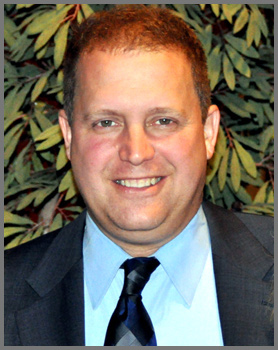
 Certain words have, in addition to merely waltzing across the stage of time, actually propelled the script of history. In particular, the interplay between two meaning-dense words can create something like a grammatical nuclear reaction; the waves of which touch every level of human existence. How people understand their meaning, source, and relationship to one another determines the course of individual lives, nations, and eternal destinies. Yes; words contain that much power. Understanding fuels application and, in turn, application determines outcome. For example, based on the handling of the terms “love” and “hate,” governments topple or bloom; families fracture or flourish; and churches either swim in redemption or sink in deception. The systematic consigning of hate as something to be avoided at all costs displays a simplistic ignorance of the word’s true meaning. How can hate be a bad word when Scripture presents the Lord as, at times, intensely hating? (Proverbs 6:16; Isaiah 61:8; Amos 6:8; Zechariah 8:18). Furthermore, God’s Word tells us that those loving the Lord will, out of respect for Him “hate evil.” (Psalm 97:10; Proverbs 8:13; Amos 5:15). Understanding the force which context exerts upon hate’s meaning produces a fuller appreciation of the term “love.” Conversely, a deeper understanding of love’s breadth magnifies the truth packaged within hate. In sum, holding a precise knowledge of each term on its own as well as their interplay makes proper application possible. Proper application then provides a manual for course correction along the path of life.
Certain words have, in addition to merely waltzing across the stage of time, actually propelled the script of history. In particular, the interplay between two meaning-dense words can create something like a grammatical nuclear reaction; the waves of which touch every level of human existence. How people understand their meaning, source, and relationship to one another determines the course of individual lives, nations, and eternal destinies. Yes; words contain that much power. Understanding fuels application and, in turn, application determines outcome. For example, based on the handling of the terms “love” and “hate,” governments topple or bloom; families fracture or flourish; and churches either swim in redemption or sink in deception. The systematic consigning of hate as something to be avoided at all costs displays a simplistic ignorance of the word’s true meaning. How can hate be a bad word when Scripture presents the Lord as, at times, intensely hating? (Proverbs 6:16; Isaiah 61:8; Amos 6:8; Zechariah 8:18). Furthermore, God’s Word tells us that those loving the Lord will, out of respect for Him “hate evil.” (Psalm 97:10; Proverbs 8:13; Amos 5:15). Understanding the force which context exerts upon hate’s meaning produces a fuller appreciation of the term “love.” Conversely, a deeper understanding of love’s breadth magnifies the truth packaged within hate. In sum, holding a precise knowledge of each term on its own as well as their interplay makes proper application possible. Proper application then provides a manual for course correction along the path of life. Questions with common themes tend to come up from time to time in the day-to-day operations of churches and ministries. I thought it would be helpful for my tax and accounting article this month to focus on some frequently asked questions that can be tricky to navigate correctly.
Questions with common themes tend to come up from time to time in the day-to-day operations of churches and ministries. I thought it would be helpful for my tax and accounting article this month to focus on some frequently asked questions that can be tricky to navigate correctly.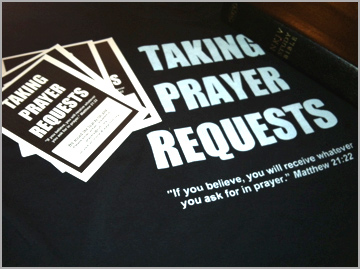 Last year when Pastors Jack and Marilyn Yurus moved their congregation, Hudson Valley Family Church, from rented rooms at a local college to assist a nearby community church, Pastor Jack knew it was ordained by God. Fixing up the church building took a tremendous amount of heavy cleaning, repairing, building, painting and patience. Yet, even as things took shape inside the building, life outside the church remained unchanged.
Last year when Pastors Jack and Marilyn Yurus moved their congregation, Hudson Valley Family Church, from rented rooms at a local college to assist a nearby community church, Pastor Jack knew it was ordained by God. Fixing up the church building took a tremendous amount of heavy cleaning, repairing, building, painting and patience. Yet, even as things took shape inside the building, life outside the church remained unchanged. After months of partisan debate, the “Patient Protection and Affordable Care Act” became law last year on March 24, 2010. The Act is widely considered to be the most significant piece of medical insurance reform legislation in the past thirty years. Known generally as “health care reform” or “Obama care” it is also highly complex and controversial, with major implications for the U.S. economy. The Act is not an easy read by any means, being over 2,400 pages in size and therefore the components of the Act will take a while for everyone to absorb.
After months of partisan debate, the “Patient Protection and Affordable Care Act” became law last year on March 24, 2010. The Act is widely considered to be the most significant piece of medical insurance reform legislation in the past thirty years. Known generally as “health care reform” or “Obama care” it is also highly complex and controversial, with major implications for the U.S. economy. The Act is not an easy read by any means, being over 2,400 pages in size and therefore the components of the Act will take a while for everyone to absorb. The following is an excerpt taken from The Art of Pacesetting Leadership by Dr. Dave Williams.
The following is an excerpt taken from The Art of Pacesetting Leadership by Dr. Dave Williams. While we read in Genesis that God rested on the seventh day, a growing number of ministers are finding that there is more work — and stress — than ever before, and fewer opportunities to unwind. The result has been a myriad of health problems among the clergy — from a lack of exercise, poor eating habits, more hypertension, a rise in obesity, problems of depression and substance abuse, higher rates of arthritis and asthma, and all of the ills of modern life that pastors spend so much time trying to help their congregants tackle. And many of these are at higher rates than most Americans.
While we read in Genesis that God rested on the seventh day, a growing number of ministers are finding that there is more work — and stress — than ever before, and fewer opportunities to unwind. The result has been a myriad of health problems among the clergy — from a lack of exercise, poor eating habits, more hypertension, a rise in obesity, problems of depression and substance abuse, higher rates of arthritis and asthma, and all of the ills of modern life that pastors spend so much time trying to help their congregants tackle. And many of these are at higher rates than most Americans.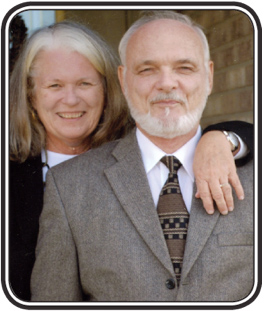 Rev. Dennis and Jeanne Cook, have been missionaries in the Darien jungle of Panama, Central America since 1981. Their four grown children, Christopher, Jennifer, Jason and Chad, spent many years helping in the ministry in the jungle. The vision of Vida Ministries is to train national pastors in a two-year Bible School and to establish strong local churches. They have established seven churches inside the Chocó Indian reservation. In 1991 the Cooks pioneered Radio Vida. It is the first and only Christian radio station in the densest jungle in the world.
Rev. Dennis and Jeanne Cook, have been missionaries in the Darien jungle of Panama, Central America since 1981. Their four grown children, Christopher, Jennifer, Jason and Chad, spent many years helping in the ministry in the jungle. The vision of Vida Ministries is to train national pastors in a two-year Bible School and to establish strong local churches. They have established seven churches inside the Chocó Indian reservation. In 1991 the Cooks pioneered Radio Vida. It is the first and only Christian radio station in the densest jungle in the world.  At breakfast a few weeks ago a great Pastor I know told me a fact about American churches I had never heard. He mentioned there are approximately 100,000 churches at or near the point of transition in their leadership. He called it, “the greatest transfer of church wealth in our history.” Churches that have been launched, buildings that have been paid off, and congregations that have grown will be handed off to the next generation of leaders within the next 10 years. Where are these leaders? Are there enough qualified leaders to take on this great responsibility?
At breakfast a few weeks ago a great Pastor I know told me a fact about American churches I had never heard. He mentioned there are approximately 100,000 churches at or near the point of transition in their leadership. He called it, “the greatest transfer of church wealth in our history.” Churches that have been launched, buildings that have been paid off, and congregations that have grown will be handed off to the next generation of leaders within the next 10 years. Where are these leaders? Are there enough qualified leaders to take on this great responsibility?  Steve Roll is a gifted pastor, counselor, author, consultant and motivator with over thirty years of ministry experience. His ministry specializes in restoration and renewal of relationships.
Steve Roll is a gifted pastor, counselor, author, consultant and motivator with over thirty years of ministry experience. His ministry specializes in restoration and renewal of relationships.  “Do not complain, brethren, against one another, that you yourselves may not be judged; behold, the Judge is standing right at the door.”
“Do not complain, brethren, against one another, that you yourselves may not be judged; behold, the Judge is standing right at the door.” 